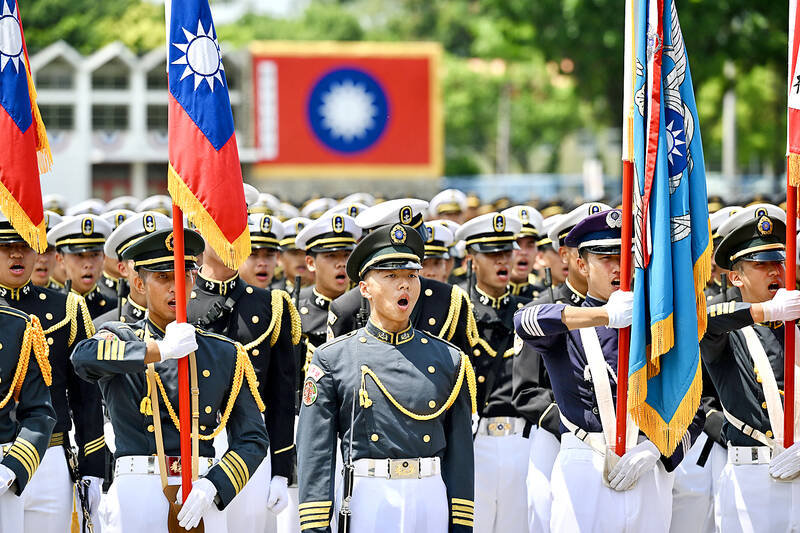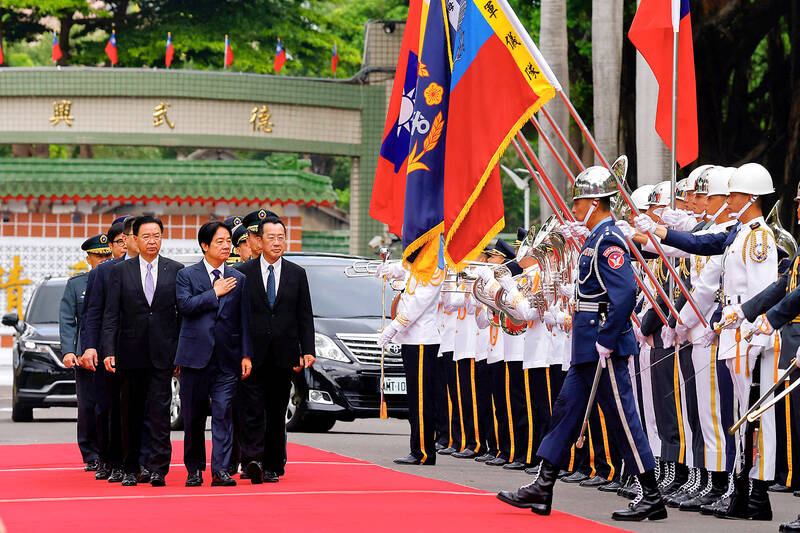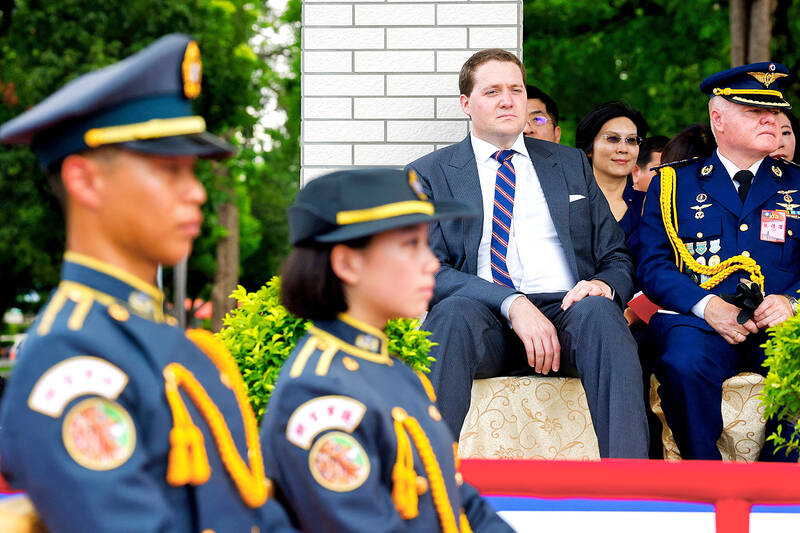President William Lai (賴清德) yesterday told students and alumni at the Republic of China Military Academy centennial in Kaohsiung that they must know their enemy and resist defeatism.
In a ceremony to celebrate the founding of the Whampoa Military Academy on June 16, 1924, in Guangzhou, China, Lai highlighted the importance of defending the nation’s sovereignty, making sacrifices and staying united.
“No countries can exist without sovereignty, and the Republic of China can only exist if Taiwan exists. You [the students] are here at the academy as you have pledged to defend the nation,” he said. “We should distinguish friend from foe, and should never accept a defeatist attitude that says our first battle with the enemy would be the last.”

Photo: Lo Pei-de, Taipei Times
He appeared to be referencing remarks by former president Ma Ying-jeou (馬英九), who in 2020 said in a speech that China’s strategy is to mount a rapid invasion of Taiwan, leaving no time for the US to come to the nation’s rescue.
The academy was relocated to Taiwan after the Chinese Civil War and reopened in Kaohsiung as the Republic of China Military Academy. As the Chinese People’s Liberation Army recruited graduates from the original academy, both nations held centennials to assert ownership of the institution’s heritage.
More than 10,000 active and retired officers had been expected at the event in Kaohsiung, while fewer than 100 were forecast to attend China’s version in Huangpu, also known as Whampoa, Veterans Affairs Council Minister Yen De-fa (嚴德發) had said.

Photo: Ann Wang, Reuters
In Kaohsiung, students marched in step in a formal military parade — the first Lai has reviewed since taking office on May 20.
Legislative Speaker Han Kuo-yu (韓國瑜), National Security Council Secretary-General Joseph Wu (吳釗燮), Minister of National Defense Wellington Koo (顧立雄) and foreign dignitaries also attended the event.
Lai said he was honored to preside over the centennial as commander-in-chief.

Photo: Ann Wang, Reuters
“The academy was established at a time when the country was in danger and was pressed on both domestic and international fronts. For a democratic republic of the people, by the people and for the people, young people joined the academy to fight wars to unite the nation, suppress communists and withstand the Japanese invasion. They were undaunted by hardships, difficulties and death,” Lai said.
Although the academy was relocated to Taiwan in 1949 following the Chinese Nationalist Party’s (KMT) loss to the Chinese Communist Party in the Chinese Civil War, it resumed operations in 1950 and defended Taiwan in the Second Taiwan Strait Crisis in 1958 and other conflicts, he said.
Students of the academy have also helped rebuild the nation after natural disasters, he added.
“Despite drastic changes over the past 100 years, we firmly believe that wherever the Republic of China is, there is the spirit of Whampoa... It is here that the spirit of Whampoa continues and prospers. Only those who would fight for the survival, development and security of the Republic of China and its people are true graduates of the academy, and those who have no such ambition are false ones,” he said.
The greatest challenge the academy’s students and graduates face is the rise of China and its intention to disrupt the “status quo” in the Taiwan Strait by annexing Taiwan and destroying the Republic of China, he said.
“Your highest commission should be to bravely defend Taiwan and maintain peace and stability across the Taiwan Strait,” he said.
Academy graduates need to realize they do not belong to any individual or political party, as they have pledged allegiance to the country, people and democracy, he said.

INVESTIGATION: The case is the latest instance of a DPP figure being implicated in an espionage network accused of allegedly leaking information to Chinese intelligence Democratic Progressive Party (DPP) member Ho Jen-chieh (何仁傑) was detained and held incommunicado yesterday on suspicion of spying for China during his tenure as assistant to then-minister of foreign affairs Joseph Wu (吳釗燮). The Taipei District Prosecutors’ Office said Ho was implicated during its investigation into alleged spying activities by former Presidential Office consultant Wu Shang-yu (吳尚雨). Prosecutors said there is reason to believe Ho breached the National Security Act (國家安全法) by leaking classified Ministry of Foreign Affairs information to Chinese intelligence. Following interrogation, prosecutors petitioned the Taipei District Court to detain Ho, citing concerns over potential collusion or tampering of evidence. The

Seventy percent of middle and elementary schools now conduct English classes entirely in English, the Ministry of Education said, as it encourages schools nationwide to adopt this practice Minister of Education (MOE) Cheng Ying-yao (鄭英耀) is scheduled to present a report on the government’s bilingual education policy to the Legislative Yuan’s Education and Culture Committee today. The report would outline strategies aimed at expanding access to education, reducing regional disparities and improving talent cultivation. Implementation of bilingual education policies has varied across local governments, occasionally drawing public criticism. For example, some schools have required teachers of non-English subjects to pass English proficiency

NEGOTIATIONS: The US response to the countermeasures and plans Taiwan presented has been positive, including boosting procurement and investment, the president said Taiwan is included in the first group for trade negotiations with the US, President William Lai (賴清德) said yesterday, as he seeks to shield Taiwanese exporters from a 32 percent tariff. In Washington, US Trade Representative Jamieson Greer said in an interview on Fox News on Thursday that he would speak to his Taiwanese and Israeli counterparts yesterday about tariffs after holding a long discussion with the Vietnamese earlier. US President Donald Trump on Wednesday postponed punishing levies on multiple trade partners, including Taiwan, for three months after trillions of US dollars were wiped off global markets. He has maintained a 10 percent

TRADE: The premier pledged safeguards on ‘Made in Taiwan’ labeling, anti-dumping measures and stricter export controls to strengthen its position in trade talks Products labeled “made in Taiwan” must be genuinely made in Taiwan, Premier Cho Jung-tai (卓榮泰) said yesterday, vowing to enforce strict safeguards against “origin laundering” and initiate anti-dumping investigations to prevent China dumping its products in Taiwan. Cho made the remarks in a discussion session with representatives from industries in Kaohsiung. In response to the US government’s recent announcement of “reciprocal” tariffs on its trading partners, President William Lai (賴清德) and Cho last week began a series of consultations with industry leaders nationwide to gather feedback and address concerns. Taiwanese and US officials held a videoconference on Friday evening to discuss the